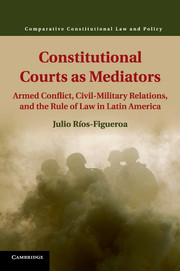 Constitutional Courts as Mediators
Constitutional Courts as Mediators Book contents
- Frontmatter
- Dedication
- Contents
- List of Figures
- List of Tables
- Acknowledgments
- 1 Constitutional Courts and the Armed Forces
- 2 A Theory of Constitutional Courts as Mediators
- 3 Constitutional Jurisprudence on Military Autonomy in Colombia, 1958–2013
- 4 Constitutional Jurisprudence on Military Autonomy in Peru, 1979–2013
- 5 Constitutional Jurisprudence on Military Autonomy in Mexico, 1917–2013
- 6 Judicial Regulation of the Use of Force in Colombia, Peru, and Mexico
- 7 Constitutional Courts as Mediators beyond Latin America
- 8 Constitutional Courts and Democratic Confl ict Solving
- References
- Index
5 - Constitutional Jurisprudence on Military Autonomy in Mexico, 1917–2013
Published online by Cambridge University Press: 05 May 2016
- Frontmatter
- Dedication
- Contents
- List of Figures
- List of Tables
- Acknowledgments
- 1 Constitutional Courts and the Armed Forces
- 2 A Theory of Constitutional Courts as Mediators
- 3 Constitutional Jurisprudence on Military Autonomy in Colombia, 1958–2013
- 4 Constitutional Jurisprudence on Military Autonomy in Peru, 1979–2013
- 5 Constitutional Jurisprudence on Military Autonomy in Mexico, 1917–2013
- 6 Judicial Regulation of the Use of Force in Colombia, Peru, and Mexico
- 7 Constitutional Courts as Mediators beyond Latin America
- 8 Constitutional Courts and Democratic Confl ict Solving
- References
- Index
Summary
Los militares de México aportaremos nuestros mejores esfuerzos al servicio de los ciudadanos sin amedrentarnos por juicios injustos, algunos sin duda erróneos, carentes de fundamento, malintencionados y que la institución armada no merece.
(We, the Mexican military officers, will offer our best efforts at the service of citizens without fear of unfair trials, some of them without a doubt wrong, lacking foundation, malicious. The national armed forces do not deserve it.)
General Salvador Cienfuegos Zepeda, Secretary of Defense (La Jornada, November 11, 2014)The epigraph is from a speech by the current (December 2015) Mexican secretary of defense in reaction to the decision by the Mexican attorney general to charge seven soldiers with crimes against public service, and three of them with more serious charges of murdering eight of the twenty-two gang and drug traffic suspects and altering the crime scene, in a military intervention in the small town of Tlatlaya on June 30, 2014. The military initially reported that all twenty-two suspects were killed in a shootout. Days after the event, the governor of the State of Mexico, where Tlatlaya is, said that “The Mexican Army showed braveness in Tlatlaya. Unfortunately, one soldier was hurt but the Armed Forces in legitimate defense intervened and shot down the criminals.” The state attorney general also confirmed and supported the military's version.
But an anonymous witness later contradicted the official version of events, telling Esquire magazine that twenty-one of the suspects, including her teenage daughter, were killed after they had surrendered. In a “bold rebuke for Mexico's powerful military,” as the New York Times reported it, “the National Commission of Human Rights issued a report confirming that bodies had been moved at the rural warehouse to suggest that everyone was killed in a shootout and that most of the people had surrendered before they were shot and killed” (New York Times, October 21, 2014). After considerable national and international pressure, the Mexican attorney general intervened and charged seven soldiers. General Cienfuego's reaction speaks for itself, but it is puzzling. What “unfair” or “malicious” trials does he have in mind?
- Type
- Chapter
- Information
- Constitutional Courts as MediatorsArmed Conflict, Civil-Military Relations, and the Rule of Law in Latin America, pp. 119 - 150Publisher: Cambridge University PressPrint publication year: 2016


